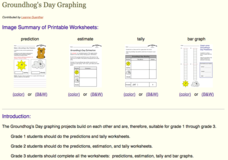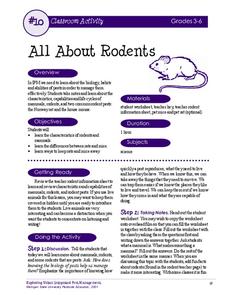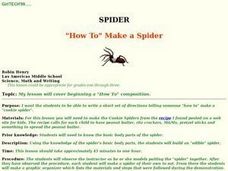Baylor College
What's That Food?
Get things cooking with the first lesson plan in this series on the science of food. Working in small groups, young scientists make and record observations about different mystery foods. These descriptions are then shared with the class...
American Chemical Society
Energy Changes in Chemical Reactions
Some chemical reactions produce heat, but what is really going on? Lesson focuses on the concept of energy changes, both exothermic and endothermic. Scholars perform multiple experiments, hands-on activities, and view videos of the...
Kid Zone
Groundhog's Day Graphing
This Groundhog's Day, challenge scholars to predict, estimate, tally, and graph in a weather-themed lesson in which class members play the role of the groundhog to forecast the weather come February second.
Science Matters
Potential and Kinetic Energy
Everything has potential energy; learning to use it is the key to understanding all types of energy. Scholars learn the difference between kinetic and potential energy. They then apply the concept to drawing examples of both types of...
Michigan State University
All About Rodents
Get to the know the common house mouse and the Norway rat with an activity that reinforces reading comprehension skills. Scholars read a three-page document detailing key information about mammals, specifically rodents, and use their...
NOAA
A Quest for Anomalies
Sometimes scientists learn more from unexpected findings than from routine analysis! Junior oceanographers dive deep to explore hydrothermal vent communities in the fourth lesson in a series of five. Scholars examine data and look for...
Curated OER
Spider "How To" Make a Spider
Young chefs follow the set-by-step instructions of a recipe and use their prior knowledge of the body parts of a spider to make edible spider cookies. After completing a pre-writing graphic organizer they then write a "how to" paragraph...
Curated OER
Sustainable Southern Belize: Coral Health Lesson Plan
Fifth graders investigate coral reefs and the dangers they face by labeling and drawing. In this oceanography lesson, 5th graders view a PowerPoint presentation of photographs of coral reefs in Belize. Students investigate and...
Curated OER
Insects and Bugs
Students recognize the difference between insects and bugs while making connections to personal experiences. In this insect and bug instructional activity, students complete a pre-assessment to demonstrate prior knowledge, then gather...
University of Colorado
Looking Inside Planets
Researchers use scientific data to understand what is inside each of the planets. The first in a series of six, this lesson builds off of that concept by having pupils use a data table to create their own scale models of the interiors of...
University of Colorado
Are All Asteroids' Surfaces the Same Age?
Did you know scientists can tell the age of an asteroid by looking closely at its craters? This final lesson of a six-part series focuses on two asteroids, Gaspra and Ida, in order to demonstrate the concept of dating asteroids. Scholars...
Center for Learning in Action
Water—Changing States (Part 1)
Here is part one of a two-part lesson in which scholars investigate the changing states of water—liquid, solid, and gas. With grand conversation and up to three demonstrations, learners make predictions about what they think will happen...
University of Georgia
Monohybrid Crosses and The Punnett Square Lesson Plan
Looking for a quick, hands-on activity to teach young scientists about Punnett squares through monohybrid crosses? then check out this one.
Curated OER
Moth or Butterfly
Students categorize butterflies and moths by identifying the unique characteristics of the two different species. In this classifying lesson, students discuss their prior knowledge about these insects before categorizing the two.
Curated OER
Gotham Equinox
By looking at the direction of the parallel streets of New York and figuring which days the setting sun is directly visible along those lines, your class can calculate the degree and angle of the sun. A really nice lesson, giving a photo...
PBS
The Planets of the Solar System
Launch a lesson that's sure to capture middle schoolers' interest! Exploration enthusiasts examine the planets of our solar system using an activity from PBS's Space series. The resource includes images and information for each planet,...
Science Matters
Just Breathe
Pupils know they need to breathe to live, but the details may not be too clear. A thorough lesson introduces them to the components of the respiratory system using a set of cards with pictures and descriptions.
NOAA
Oceans of Energy
Are the earth's oceans really just giant batteries, waiting for their energy to be harnessed? Middle school mechanical engineers will be shocked by the amazing amount of energy that forms around them after diving into part four of a...
US National Library of Medicine
Genetic Traits in Harry Potter
Explore human genetics through the world of Harry Potter. A thorough lesson develops the introductory concepts of genetics using characters of the popular book series. Learners study topics from DNA and chromosomes to Punnett Squares and...
Science Matters
Pre-Assessment: Transport Systems in Animals and Plants
How much do classes know about the transport systems in animals and plants? Find out with a ready-made pre-assessment! The assessment begins by asking individuals to recall related vocabulary and then progresses to questions about...
University of Florida
A Walk in the Woods
Take class members on a field trip to the forest without leaving the classroom. Scholars learn content-related vocabulary and factors affecting forest health with class discussions and during a presentation. Scientists combine forestry...
Curated OER
Chapter 1: The Science of Biology
Provide young biologists with everything they need to excel in the study of lymphatics, the nervous system, hormones, cellular division, and more! Pupils utilize the workbook, complete with end-of-chapter assessment worksheets, to gain...
PHET
Planet Designer: Retro Planet Red
What does the atmosphere on Mars look like? This fourth lesson plan in the series of five is designed for high schoolers. Scholars apply previous knowledge to add atmosphere to Mars in an online simulation. This comprehensive lesson plan...
New York State Education Department
TASC Transition Curriculum: Workshop 11
You'll C-E-R a difference in classroom achievement after using a helpful lesson. Designed for economics, civics, government, and US history classes, participants practice using the CER model to craft arguments about primary and secondary...

























